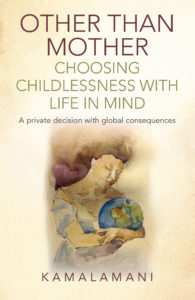
 Review by Issa M. Lewis
Review by Issa M. Lewis
In the early chapters of Other Than Mother: Choosing Childlessness with Life in Mind, Kamalamani cites a researcher who claims, “Intentionally childless women have been reported as ‘deviant’” (42). This is the crux of her argument: that those women who have not given birth—either by choice, circumstance, or a combination of the two—are subject to raised eyebrows, intrusive questions, and judgment by what she calls a “pronatal” society. To give birth to and rear children is the default; to do otherwise, for any reason, is to assume a role of countercultural defiance. However, as Kamalamani points out, “with approximately one in four women deciding not to have children” (129), clearly many more women are considering it than ever before.
Therefore, this book’s primary purpose is to assist a person in making that choice in a thoughtful, introspective manner by providing personal anecdotes, research, and journal prompts for the reader to answer at the end of each chapter. Kamalamani’s honesty in the telling of her own story is compelling, and the research she shares is helpful in understanding one of her primary reasons for remaining childless: the ecological impact of overpopulation. She writes
Deciding to choose to have six children remains a non-political decision, even though we collectively face, or in truth, are just turning towards, the challenges we face. There may be sufficient food, water, and shelter for everyone on the planet, but so far we have fallen short in ensuring everyone leads a free, fed life, as well as not only ignoring, but actually compromising the health of the planet. (53)
Indeed, she references the United Nations, according to whom the world population numbered six billion in 1999, and is estimated now to be over seven billion (53). While we may automatically consider childbearing to be an inalienable right of all living people, rarely do we consider the impact of our family’s growth on others or our environment.
Kamalamani’s faith as a practitioner of Buddhism also deeply informs her choice for childlessness. As she quotes from Macy,
When you look at what is happening to our world—and it is hard to look at what is happening to our water, our air, our trees, our fellow species—it becomes clear that, unless you have some roots in spiritual practice that holds life sacred and encourages joyful communion with all your fellow beings, facing the enormous challenges ahead is nearly impossible. (159)
While Kamalamani chooses Buddhism as her spiritual foothold, a person of any faith can extrapolate the significance of Macy’s words. Almost all major world religions and philosophies stress the value of life; however, in this case, Other Than Mother urges us to interpret that value in terms of the life already here on the planet—“fellow species” who are struggling as their habitats are being destroyed, and fellow humans who, despite Earth’s abundance, still struggle to obtain daily necessities, even in developed nations.
Most useful, however, is the book’s third and final section, which helps readers who have made the choice to remain childless determine what happens next for them. They may decide to take on “baby-sized projects,” as they are called, or they may experience periods of doubt or regret. It may be difficult at times to speak honestly with those around us—family, friends, and strangers alike—about these personal decisions, knowing that to do so often invites intense scrutiny. All of these, the author reminds us, are normal, and again she refers us to our spiritual grounding for both guidance and strength.
Finally, although it may not have been the intention, Other Than Mother serves an additional purpose: educating those who have opted in or expect to one day bring children into the world about the idea that it is a choice, and that there are legitimate reasons to choose either path. That understanding alone could pave the way for more men and women to feel comfortable in choosing a childless life without feeling “deviant.”
Other Than Mother: Choosing Childlessness with Life in Mind
by Kamalamani
Earth Books (2016), $25.95 [paper]
ISBN 9781782798200
Issa M. Lewis holds an MFA in Poetry from New England College and teaches composition and professional writing at Davenport University. Her poems have appeared in publications such as Blue Lyra Review, Jabberwock, Mom Egg, and Tule Review. She lives in southwest Michigan with her husband and two sons
